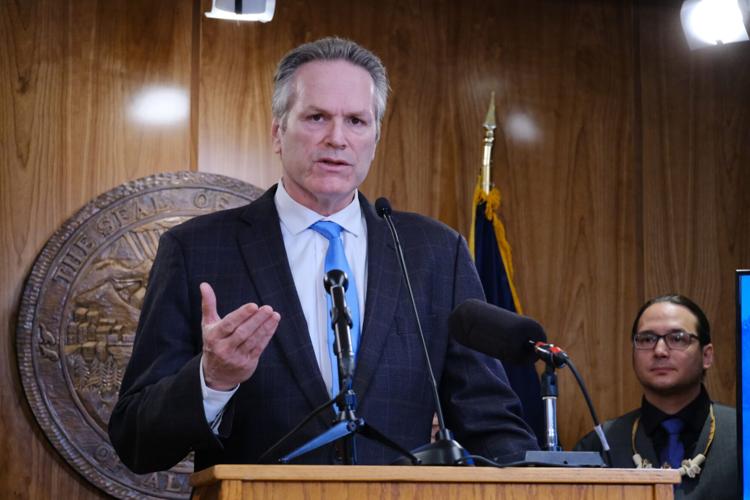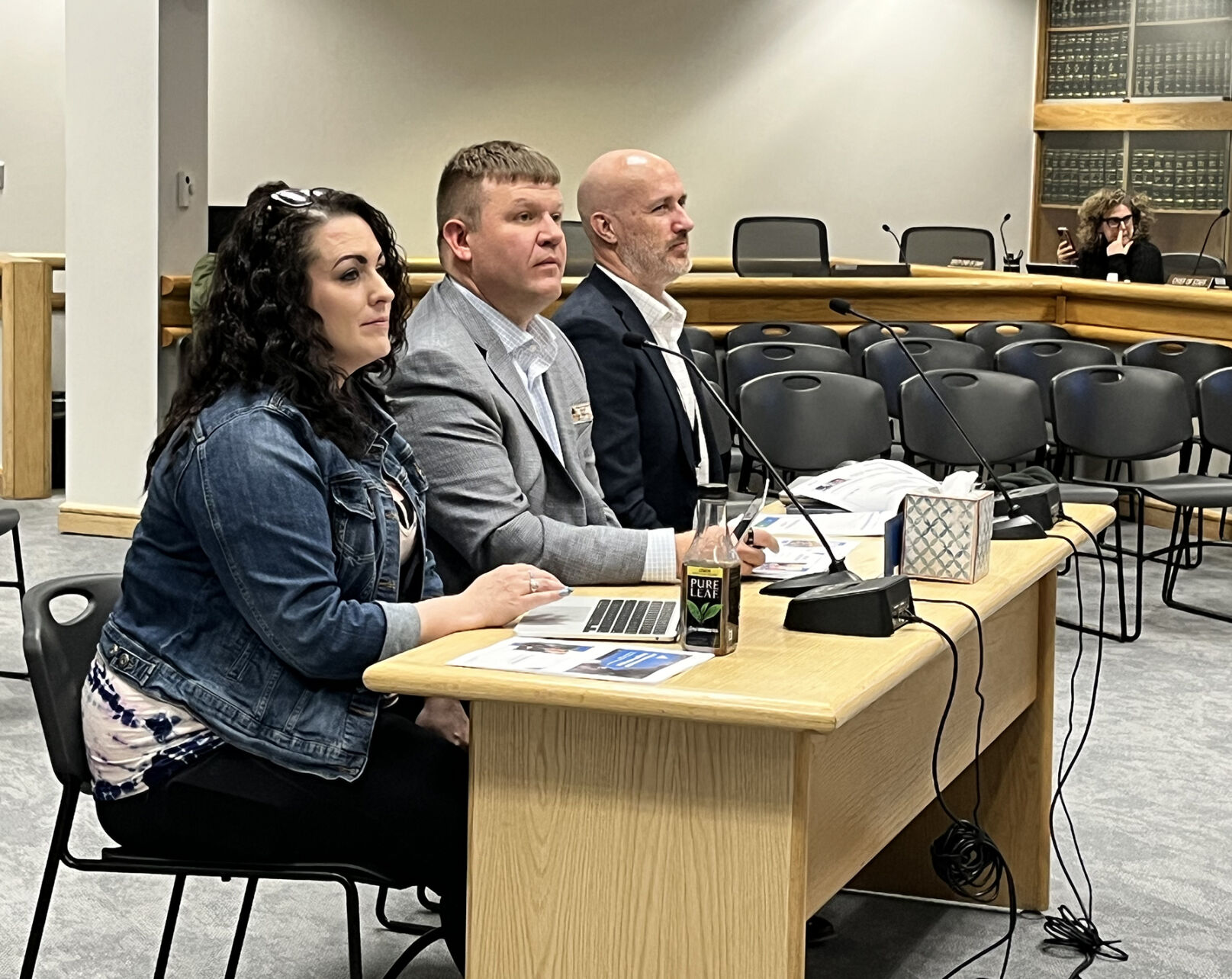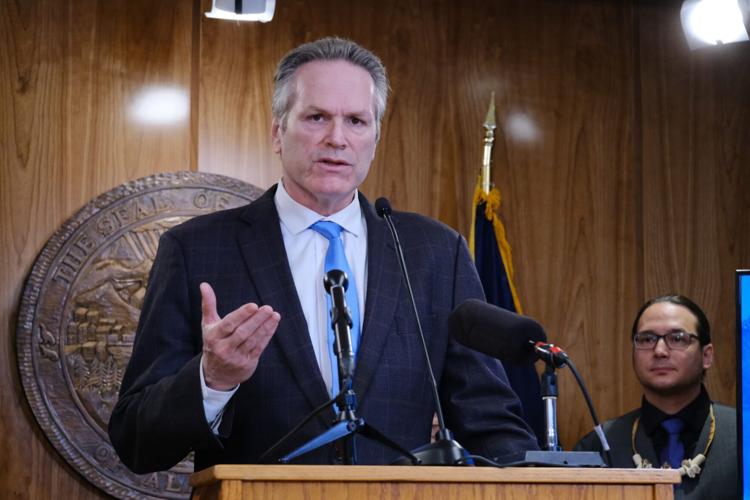Gov. Mike Dunleavy vetoed an education funding increase on Thursday, nearly a week after the Alaska Legislature approved it.
House Bill 69 would have permanently increased the state’s per-pupil Base Student Allocation (BSA) by $1,000, raising it to $6,690. The bill initially included policy provisions that were later stripped by the Senate Finance Committee — something Dunleavy said all but guaranteed he would veto the legislation.
Dunleavy told reporters on Thursday that he vetoed the bill due to the absence of policies and the state’s looming financial crisis.
“We support funding but we’re not going to support a very unbalanced, one-sided coin that is just funding only when we have opportunities to improve educational outcomes,” Dunleavy said.
Dunleavy proposed a bill that includes a $560 base BSA increase and $35 million for “targeted funding and policy reforms.” He added that it’s comparable to a $700 increase.
Education policymakers, school district officials, and lawmakers have called for increased funding since at least 2017. In recent years, school districts across Alaska have closed schools and made major cuts to programs and positions.
The Fairbanks North Star Borough School District Board of Education is no exception. It recently adopted an austere budget that increases class sizes and cuts administrative costs, along with teacher and counselor positions. The budget follows the closure of three schools in February and the outsourcing of custodian services last November.
“The governor’s decision to veto HB 69, while disappointing, isn’t surprising,” said Melissa Burnett, the Fairbanks school board president. “Once the policies were removed, it became clear he would veto it.”
According to a school board memo, the $1,000 increase would have provided the district with at least $5.6 million in additional revenue, which could have been used to reduce class sizes.
School board member Morgan Dulian, however, doesn’t support the veto.
She told Alaska’s News Source Fairbanks that Alaska’s public school system continues to be “grossly underfunded.” FNSBSD, for example, has cut at least $50 million over seven years at the cost of students, educators and programs.
“We cannot expect to have increased outcomes if we say that we aren’t going to fund them, so I don’t believe that policy and funding are mutually exclusive,” Dulian told Alaska’s News Source.
She, like Dunleavy, used the Reads Act, passed in 2022 and enacted in 2023, as a good example of policy and funding. The Reads Act provided a meager $30 BSA increase with the goal to improve reading outcomes in grades K-3.
Danette Peterson, president of the Fairbanks Education Association, said her union is not happy about the veto. Like Burnett, she said she’s not surprised.
“We desperately need a permanent increase to the BSA, as we have been underfunded for nearly a decade,” Peterson said. “The effects are apparent in our school district.”
Dunleavy still optimistic
Dunleavy said he remains “optimistic we can still get something done” in the remaining 33 days of the legislative session.
His proposed policies include reforms to the charter school application process, parity for homeschool BSA funding, open enrollment policies, and other measures.
”This is a bill that if agreed upon by the legislature, I would sign tomorrow,” Dunleavy said. “It will have policies that will help kids.”
During his press conference, he criticized unions like the National Education Association for obstructing meaningful policy reforms and noted the growth of Alaska’s charter and homeschool programs.
”What we are asking is very simple: don’t stand in the way of parent groups wanting to form a charter school,” he said. He repeated that he’s not interested in new tax solutions, especially “tax and spend bills.”
Burnett said there’s still time to “bring back the conversation on a meaningful increase with policies attached.” She defined a meaningful increase as anything above a $680 BSA boost, which the state provided on a one-time basis last year.
A $700 increase helps, she said, “but it would not fix our problems.”
Burnett added that some policies, such as open enrollment and homeschool funding adjustments, can be implemented quickly and effectively. The district already has an out-of-boundary enrollment process that allows students to attend schools outside their assigned zones.
“In the meantime, advocate to the Legislature, share your stories, and tell them what Fairbanks is feeling,” Burnett said.
Peterson said the FEA agrees with some of Dunleavy’s proposed changes, including school and family choice, increased transportation funding, and enhanced career and technical education programs.
“But we also need a permanent BSA increase in the funding formula,” Peterson said.
Peterson praised the Fairbanks North Star Borough for doing what it can with local funding but noted that those resources are stretched thin.
“Schools are the foundation of a local community,” Peterson said. “Families choose to live based on schools. I want us to be a community that can offer quality education.”
Push for veto override
State education advocacy groups have urged the Alaska Legislature to override Dunleavy’s veto. That effort requires a three-quarters vote of both the Senate and the House — approximately 40 of 60 lawmakers — something several legislators have said may be unlikely.
HB 69 passed without support from the Republican minority caucuses. The three Senate Finance Committee co-chairs also voted against it.
Dunleavy has vetoed major education funding legislation in some form for three consecutive years. However, he has supported funding increases on a one-time basis.
“While we agree that additional funding for education is necessary, the fiscal reality dictates that the amount put forward match this reality,” Dunleavy’s veto message reads. “The amount put forward in this bill does not.”
Rep. Will Stapp (R-Fairbanks) said he voted against HB 69 because the state lacks the funds to pay for it. However, he does support the governor’s proposed legislation.
“His bill is pretty reasonable, though it’s a little less funding than I would like to see,” Stapp said. “But I think we should pass it because he is committed to signing it and work to increase extra funding through the budgeting process so that it balances.”
Stapp voted to override Dunleavy’s veto of a $680 BSA increase last year, though the attempt failed by a single vote.
Rep. Ashley Carrick (D-Fairbanks) stated on social media that she’s a “hard yes on overturning the governor’s veto.”
“This action will have devastating impacts on education in Alaska, especially in Fairbanks where we have already had to make the difficult decision to close three schools this year,” Carrick wrote. “Due to this action, Fairbanks will have no choice but to close more schools, increase class sizes, and cut programs further.”



